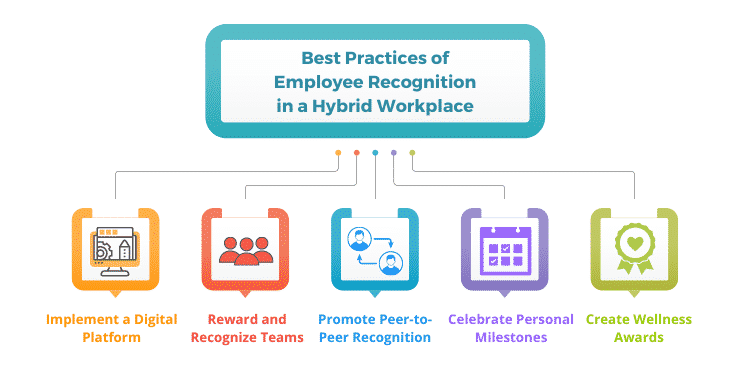1. Implementing digital platforms for recognition is crucial in hybrid workplaces to ensure the visibility and inclusion of remote and onsite employees.
2. Team recognition and peer-to-peer acknowledgment foster collaboration and reduce isolation among remote workers.
B. Celebrating personal milestones and creating wellness awards can enhance employee motivation and promote a sense of belonging.
4. These practices help maintain employee engagement and morale in a hybrid work environment, ensuring that all employees feel valued, regardless of their location.
In the aftermath of the COVID-19 Pandemic, many organizations have adopted a hybrid working model, with one segment of their workforce regularly working from home. Hence, organizations need to explore employee recognition in a hybrid workplace to keep their employees motivated, regardless of their physical location.

With many organizations adopting the hybrid model of work, it is not going to be an easy task for them to keep their workforce motivated in this hybrid workplace.
Here are the key challenges:
1. The possibility of unconscious bias against remote working employees among peers and managers.
2. Communication, collaboration, and teamwork between onsite and remote working team members.
3. Performance measurement and monitoring of remote working employees compared to those working onsite.
4. Ensuring that onsite and remote employees feel equally valued and appreciated.
5. Remote working employees often experience a growing sense of isolation. They feel disconnected from the day-to-day operations of the organization.

Here are a few best practices of employee recognition that organizations working in a hybrid model can consider to derive the maximum benefits:
1. Implement a Digital Platform
2. Reward and Recognize Teams
3. Promote Peer-to-Peer Recognition
4. Celebrate Personal Milestones
5. Create Wellness Awards


A digital employee recognition platform is one of the best ways to facilitate employee recognition in a hybrid workplace.
It helps bridge the gap between the onsite and remote workforce by bringing everyone onto a single digital platform.
Hence, employee recognition platforms can enable managers and peers to recognize coworkers instantaneously, irrespective of their location.
Additionally, they can help create organization-wide visibility of those being rewarded and recognized.

Teamwork in a hybrid work environment can be challenging. Motivating teams with both onsite and remote-working members through team awards is especially important.
Team rewards and recognition encourage team members to work together by overcoming the challenges of working from different locations.
Hence, hybrid teams are more likely to use practical digital collaboration tools such as Slack and Teams.

Peer-to-peer recognition is a critical element of any employee recognition program.
Hence, peer recognition assumes greater significance in a hybrid work environment as most employees do not get to meet each other in person.
Employees can thank and acknowledge one another for any help or support, and appreciate each other for their achievements.
Therefore, such actions can motivate employees to perform at higher levels and create an atmosphere of camaraderie and collaboration.

Another effective way of motivating employees and creating social bonding in a hybrid workspace is by celebrating their key personal milestones.
These could be birthdays, work anniversaries, specific professional achievements, etc.
Organizations can leverage digital employee recognition platforms for such celebrations. Team celebrations can be held on hybrid platforms such as Microsoft Teams and Slack.

Additionally, employee wellness programs are becoming increasingly important parts of the HR strategy for most organizations, especially after the outbreak of the COVID-19 pandemic.
Digital corporate wellness platforms can help not only in providing relevant content but also enable tracking of wellness activities of employees against their wellness goals.
These digital wellness platforms enable organizations to host virtual wellness challenges and contests that engage individual employees and teams.
Eventually, winners of such wellness events can be rewarded and recognized through digital recognition platforms, driving participation and engagement in these activities.
Organizations working in a hybrid model should create a culture in which supervisors and coworkers develop a habit of appreciating and acknowledging employees through digital recognition platforms.
Hence, ensuring proper and timely employee recognition in a hybrid workplace is essential to enhancing the workforce’s motivation and effectiveness.
Therefore, the above best practices can help the organization develop and implement an effective employee recognition program for the hybrid work model.

Lead author: Sagar Chaudhuri, the Co-Founder and CEO of HiFives. He is an HR Tech Evangelist with over 25 years of experience in both corporate and entrepreneurial settings. Previously, Sagar has held leadership roles with companies such as Genpact, Infosys, and ICICI Bank. He has an engineering degree from IIT Kharagpur and an MBA from IIM Lucknow. Connect on LinkedIn
To stay updated on the latest HiFives blogs, follow us on Twitter (@MyHiFives)